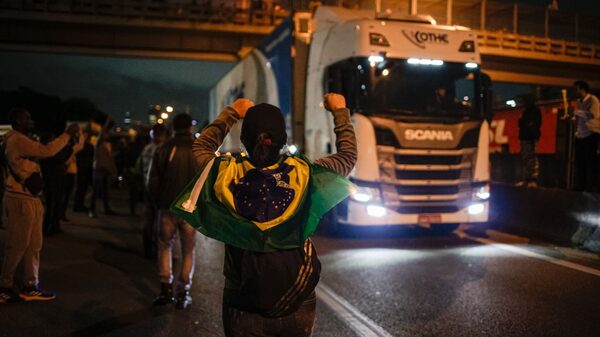Bloomberg — When Brazil’s electoral court announced Luiz Inacio Lula da Silva’s election win on Sunday evening, the defeated President Jair Bolsonaro stayed home and said nothing.
Ministers who tried to visit him found the gates to the official residence in Brasilia shut. At around 10 p.m. the lights were turned off.
He didn’t concede the following day either, and amid the growing uncertainty created by the president’s silence, some of his supporters began to protest and question the results, taking to the streets and blocking highways.
This account is based on interviews with Bolsonaro allies and Brasilia insiders, who asked not to be named discussing private meetings. They paint the picture of a president who was deeply convinced he would come back from a first round loss to win the election and remained in shock once the outcome wasn’t what he expected.
On the streets, some of the president’s supporters even called on the armed forces to intervene to overturn the election result, a dangerous tactic in a country that had military rule as recently as the 1980s.
By then, several key players, including Bolsonaro allies and the US government, had acknowledged Lula’s victory, making it harder for the president to challenge the result. Fears that he was ready to do so had been fueled by the former army captain himself, who had repeatedly questioned the integrity of Brazil’s voting system, even complaining of unfair treatment by electoral authorities.
Read more on Brazil’s election aftermath:
Lower House speaker Arthur Lira, a supporter of the president, congratulated the leftist leader minutes after the results were announced.
On Monday, rumors swirled around Brazil’s capital, inflamed by false tweets, that the president would finally make his concession speech, thereby calming a potentially volatile situation. He met with his son, senator Flavio Bolsonaro, his running-mate General Walter Braga Netto, then headed to the Presidential Palace for four hours of meetings, including with members of his cabinet.
The president and his aides spent hours going over the wording of his concession speech. His team believed he would address the nation that night, but Monday evening came and went, and still Bolsonaro said nothing publicly, and the protests continued to swell.
Truck Blockade
By Monday night, truckers and other backers of the president were blocking more than 300 roads across the nation, which relies mainly on highways to transport billions of dollars worth of grains and other commodities for domestic consumption and exports.
To diffuse a situation that was becoming increasingly alarming, senior members of Brazil’s political elite and judiciary came together to convince Bolsonaro to pull the country back from the brink of chaos. Congressional leaders, members of the supreme court and others reached out to members of Bolsonaro’s cabinet, including Economy Minister, Paulo Guedes, to urge the president to speak and calm the situation.
They asked him to publicly concede defeat, and to call on the truckers to halt their economically-destructive demonstrations, according to three people with knowledge of the matter who asked not to be named because the discussions weren’t public.
At the same time, the powerful transportation and agribusiness lobbies, which are close to Bolsonaro, publicly rejected the blockages for the significant economic damage they would do in one of the world’s largest food exporters.
On Tuesday morning, dozens of official cars began arriving at the official residence. By early afternoon, 22 of his 23 ministers were there.
Some of them argued that the president needed to fix the highway blockades, which were risking shortages of key goods. They also told Bolsonaro’s backers that their leader is Brazil’s president until the end of the year, so he’ll be the one held responsible for any crisis, said one of the people with knowledge of the matter.
Bolsonaro invited Supreme Court justices to stand alongside him when he made his national address, but they declined until they had heard what he would say. The justices indicated that they would only speak with the president once he had acknowledged the result.
Reporters who had been waiting outside the presidential palace since the early hours were finally allowed to enter mid-afternoon. Then, at 4:35 p.m., almost 45 hours after the announcement of the result, the president finally emerged to make the national address of less than three minutes.
“I’ve always been labeled as antidemocratic but unlike my accusers, I’ve always played by the rules,” Bolsonaro said. “As president and a citizen, I’ll continue to follow our constitution.”
That grudging, semi-concession caused a wave of relief to sweep through Brazil’s political elite, who took it to mean that the president didn’t have any appetite for a major constitutional crisis.
Bolsonaro’s allies began meeting with Lula’s aides to organize the transition on Thursday, while most of the protesters went home.
Read more on Bloomberg.com




